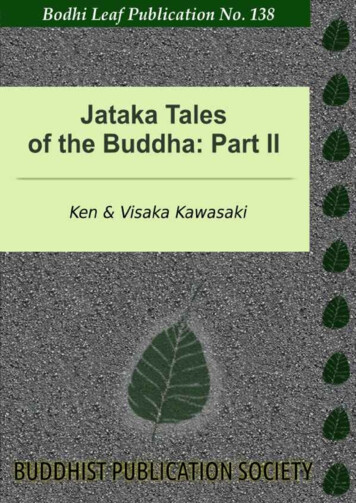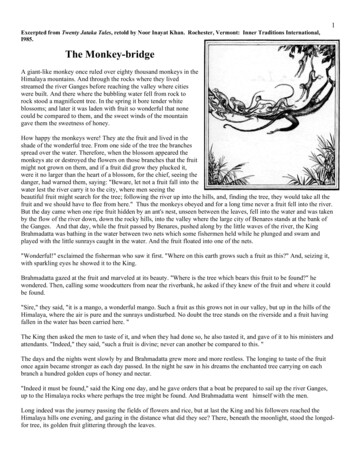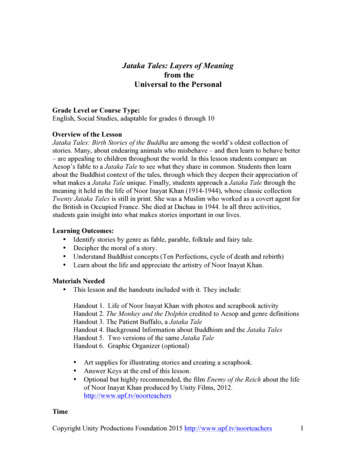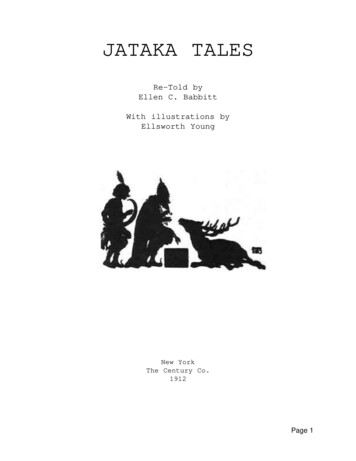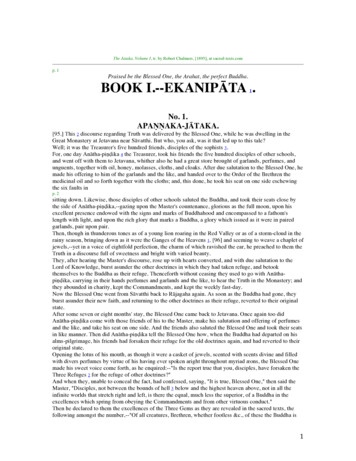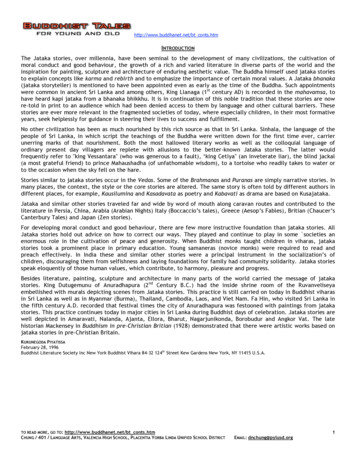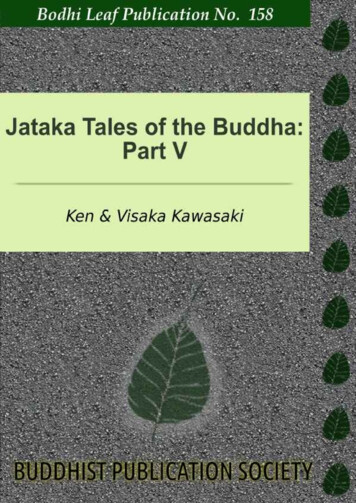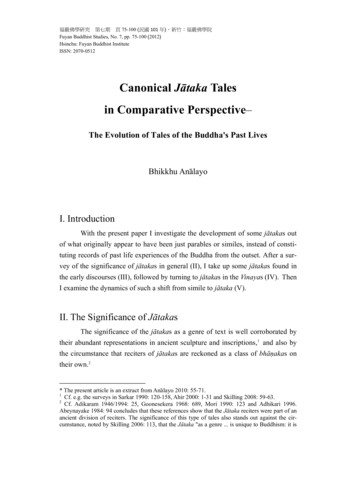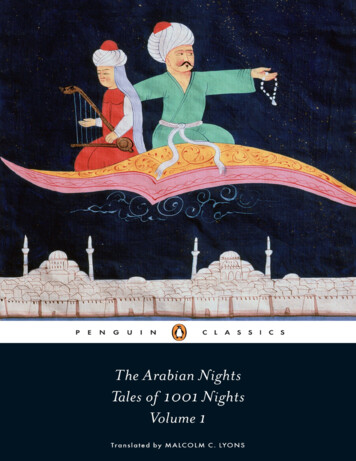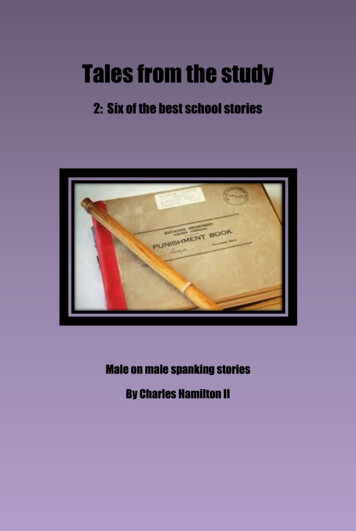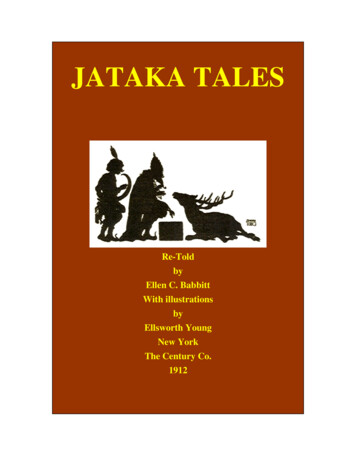
Transcription
JATAKA TALESRe-ToldbyEllen C. BabbittWith illustrationsbyEllsworth YoungNew YorkThe Century Co.1912
Title PageForewordPublisher's NoteI. The Monkey and the CrocodileII. How the Turtle Saved His Own LifeIII. The Merchant of SeriIV. The Turtle Who Couldn't Stop TalkingV. The Ox Who Won the ForfeitVI. The Sandy RoadVII. The Quarrel of the QuailsVIII. The Measure of RiceIX. The Foolish, Timid RabbitX. The Wise and the Foolish MerchantXI. The Elephant Girly-FaceXII. The Banyan DeerXIII. The Princes and the Water-SpriteXIV. The King's White ElephantXV. The Ox Who Envied the PigXVI. Grannie's BlackieXVII. The Crab and the CraneXVIII. Why the Owl Is Not King of the BirdsPage 2 of 55A Gift to the ChildrenMaung Paw, California
JATAKA TALESRe-Told byEllen C. BabbittWith illustrations byEllsworth YoungNew YorkThe Century Co.1912Scanned by Eliza Fegley at sacredspiral.com. Additional formatting by John Bruno Hare at sacredtexts.com, March, 2004. This text is in the public domain. These files may be used for any noncommercial purpose, provided this notice of attribution is left intact.FOREWORDLong ago I was captivated by the charm of the Jataka Tales and realized theexcellent use that might be made of them in the teaching of children. The obviouslessons are many of them suitable for little people, and beneath the obvious thereare depths and depths of meaning which they may learn to fathom later on. TheOriental setting lends an additional fascination. I am glad that Miss Babbitt hasundertaken to put together this collection, and commend it freely to teachers andparents.FELIX ADLER.PUBLISHER’S NOTEThe Jatakas, or Birth-stories, from one of the sacred books of the Buddhists andrelate to the adventures of the Buddha in his former existences, the best character inany story being identified with the Master.Page 3 of 55A Gift to the ChildrenMaung Paw, California
These legends were continually introduced into the religious discourses of theBuddhist teachers to illustrate the doctrines of their faith or to magnify the gloryand sanctity of the Buddha, somewhat as medieval preachers in Europe used toenliven their sermons by introducing fables and popular tales to rouse the flagginginterest of their hearers.Sculptured scenes from the Jatakas, found upon the carved railings around the relicshrines of Sanchi and Amaravati and of Bharhut, indicate that the "Birth-stories"were widely known in the third century B.C., and were then considered as part ofthe sacred history of the religion. At first the tales were probably handed downorally, and it is uncertain when they were put together in systematic form.While some of the stories are Buddhistic and depend for their point on some customor idea peculiar to Buddhism, many are age-old fables, the flotsam and jetsam offolk-lore, which have appeared under various guises throughout the centuries, aswhen they were used by Boccaccio or Poggio, merely as merry tales, or by Chaucer,who unwittingly puts a Jataka story into the mouth of his pardoners when he tellsthe tale of "the Ryotoures three."Quaint humor and gentle earnestness distinguish these legends and they teach manywholesome lessons, among them the duty of kindness to animals.Dr. Felix Adler in his "Moral Instruction of Children," says:The Jataka Tales contain deep truths, and are calculated to impress lessons of greatmoral beauty. The tale of the Merchant of Seri, who gave up all that he had inexchange for a golden dish, embodies much the same idea as the parable of thepriceless Pearl, in the New Testament. The tale of the Measures of Rice illustratesthe importance of a true estimate of values. The tale of the Banyan Deer, whichoffered its life to save a roe and her young, illustrates self-sacrifice of the noblestsort. The tale of the Sandy Road is one of the finest in the collection.And he adds that these tales "are, as everyone must admit, nobly conceived, lofty inmeaning, and many a helpful sermon might be preached from them as texts."Page 4 of 55A Gift to the ChildrenMaung Paw, California
THE MONKEY AND THE CROCODILEPART IA MONKEY lived in a great tree on a river bank.In the river there were many Crocodiles. A Crocodile watchedthe Monkeys for a long time, and one day she said to her son:"My son, get one of those Monkeys for me. I want the heart of aMonkey to eat.""How am I to catch a Monkey?" asked the little Crocodile. "I do not travel on land,and the Monkey does not go into the water.""Put your wits to work, and you'll find a way," said the mother.And the little Crocodile thought and thought.At last he said to himself: "I know what I'll do. I'll get that Monkey that lives in abig tree on the river bank. He wishes to go across the river to the island where thefruit is so ripe."So the Crocodile swam to the tree where the Monkey lived. But he was a stupidCrocodile."Oh, Monkey," he called, "come with me over to the island where the fruit is soripe.""How can I go with you?" asked the Monkey. "I do not swim.""No--but I do. I will take you over on my back," said the Crocodile.The Monkey was greedy, and wanted the ripe fruit, so he jumped down on theCrocodile's back.Page 5 of 55A Gift to the ChildrenMaung Paw, California
"Off we go!" said the Crocodile."This is a fine ride you are giving me!" said the Monkey."Do you think so? Well, how do you like this?" asked the Crocodile, diving."Oh, don't!" cried the Monkey, as he went under the water. He was afraid to let go,and he did not know what to do under the water.When the Crocodile came up, the Monkey sputtered and choked. "Why did youtake me under water, Crocodile?" he asked."I am going to kill you by keeping youunder water," answered the Crocodile."My mother wants Monkey-heart to eat,and I'm going to take yours to her.""I wish you had told me you wanted myheart," said the Monkey, "then I might have brought it with me.""How queer!" said the stupid Crocodile. "Do you mean to say that you left yourheart back there in the tree?""That is what I mean," said the Monkey. "If you want my heart, we must go back tothe tree and get it. But we are so near the island where the ripe fruit is, please takeme there first.""No, Monkey," said the Crocodile, "I'll take you straight back to your tree. Nevermind the ripe fruit. Get your heart and bring it to me at once. Then we'll see aboutgoing to the island.""Very well," said the Monkey.But no sooner had he jumped onto the bank of the river than--whisk! up he ran intothe tree.Page 6 of 55A Gift to the ChildrenMaung Paw, California
From the topmost branches he called down to the Crocodile in the water below:"My heart is way up here! If you want it, come for it, come for it!"PART IITHE Monkey soon moved away from that tree. He wanted to get away from theCrocodile, so that he might live in peace.But the Crocodile found him, far down the river, living in another tree.In the middle of the river was an island covered with fruit-trees.Half-way between the bank of the river and the island, a large rock rose out of thewater. The Monkey could jump to the rock, and then to the island. The Crocodilewatched the Monkey crossing from the bank of the river to the rock, and then to theisland.He thought to himself, "The Monkey will stay on the island all day, and I'll catchhim on his way home at night."The Monkey had a fine feast, while the Crocodile swam about, watching him all day.Toward night the Crocodile crawled out of the water and lay on the rock, perfectlystill.When it grew dark among the trees, the Monkey started for home. He ran down tothe river bank, and there he stopped."What is the matter with the rock?" the Monkey thought to himself. "I never saw itso high before. The Crocodile is lying on it!"But he went to the edge of the water and called: "Hello, Rock!"No answer.Page 7 of 55A Gift to the ChildrenMaung Paw, California
Then he called again: "Hello, Rock!"Three times the Monkey called, and then he said: "Why is it, Friend Rock, that youdo not answer me to-night?""Oh," said the stupid Crocodile to himself, "the rock answers the Monkey at night.I'll have to answer for the rock this time."So he answered: "Yes, Monkey! What is it?"The Monkey laughed, and said: "Oh, it's you, Crocodile, is it?""Yes," said the Crocodile. "I am waiting here for you. I am going to eat you.""You have caught me in a trap this time," said the Monkey. "There is no other wayfor me to go home. Open your mouth wide so I can jump right into it."Now the Monkey well knew that when Crocodiles open their mouths wide, they shuttheir eyes.While the Crocodile lay on the rock with his mouth wide open and his eyes shut, theMonkey jumped.But not into his mouth! Oh, no! Helanded on the top of the Crocodile'shead, and then sprang quickly to thebank. Up he whisked into his tree.When the Crocodile saw the trick theMonkey had played on him, he said:"Monkey, you have great cunning. You know no fear. I'll let you alone after this.""Thank you, Crocodile, but I shall be on the watch for you just the same," said theMonkey.Page 8 of 55A Gift to the ChildrenMaung Paw, California
IIHOW THE TURTLE SAVED HIS OWN LIFEA KING once had a lake made in the courtyard for the young princes to play in.They swam about in it, and sailed their boats and rafts on it. One day the king toldthem he had asked the men to put some fishes into the lake.Off the boys ran to see the fishes. Now, along with the fishes, there was a Turtle. Theboys were delighted with the fishes, but they had never seen a Turtle, and they wereafraid of it, thinking it was a demon. They ran back to their father, crying, "There isa demon on the bank of the lake."The king ordered his men to catch the demon, and to bring it to the palace. Whenthe Turtle was brought in, the boys cried and ran away.The king was very fond of his sons, so he ordered the men who had brought theTurtle to kill it."How shall we kill it?" they asked."Pound it to powder," said some one. "Bake it in hot coals," said another.So one plan after another was spoken of.Then an old man who had always beenafraid of the water said: "Throw thething into the lake where it flows outover the rocks into the river. Then it willsurely be killed."When the Turtle heard what the old mansaid, he thrust out his head and asked: "Friend, what have I done that you shoulddo such a dreadful thing as that to me? The other plans were bad enough, but tothrow me into the lake! Don't speak of such a cruel thing!"Page 9 of 55A Gift to the ChildrenMaung Paw, California
When the king heard what the Turtle said, he told his men to take the Turtle at onceand throw it into the lake.The Turtle laughed to himself as he slid away down the river to his old home."Good!" he said, "those people do not know how safe I am in the water!"Page 10 of 55A Gift to the ChildrenMaung Paw, California
IIITHE MERCHANT OF SERITHERE was once a merchant of Seri who sold brass and tin ware. He went fromtown to town, in company with another man, who also sold brass and tin ware. Thissecond man was greedy, getting all he could for nothing, and giving as little as hecould for what he bought.When they went into a town, they divided the streets between them. Each man wentup and down the streets he had chosen, calling, "Tin ware for sale. Brass for sale."People came out to their door-steps, and bought, or traded, with them.In one house there lived a poor old woman and her granddaughter. The family hadonce been rich, but now the only thing they had left of all their riches was a goldenbowl. The grandmother did not know it was a golden bowl, but she had kept thisbecause her husband used to eat out of it in the old days. It stood on a shelf amongthe other pots and pans, and was not often used.The greedy merchant passed this house, calling, "Buy my water-jars! Buy mypans!" The granddaughter said: "Oh, Grandmother, do buy something for me!""My dear," said the old woman, "we are too poor to buy anything. I have notanything to trade, even.""Grandmother, see what the merchant will give for the old bowl. We do not usethat, and perhaps he will take it and give us something we want for it."The old woman called the merchant and showed him the bowl, saying, "Will youtake this, sir, and give the little girl here something for it?"Page 11 of 55A Gift to the ChildrenMaung Paw, California
The greedy man took the bowl andscratched its side with a needle. Thus hefound that it was a golden bowl. He hopedhe could get it for nothing, so he said:"What is this worth? Not even ahalfpenny." He threw the bowl on theground, and went away.By and by the other merchant passed the house. For it was agreed that eithermerchant might go through any street which the other had left. He called: "Buy mywater-jars! Buy my tin ware! Buy my brass!"The little girl heard him, and begged her grandmother to see what he would give forthe bowl."My child," said the grandmother, "the merchant who was just here threw the bowlon the ground and went away. I have nothing else to offer in trade.""But, Grandmother," said the girl, "that was a cross man. This one looks pleasant.Ask him. Perhaps he 'l'l give some little tin dish.""Call him, then, and show it to him," said the old woman.As soon as the merchant took the bowl in his hands, he knew it was of gold. He said:"All that I have here is not worth as much as this bowl. It is a golden bowl. I am notrich enough to buy it."Page 12 of 55A Gift to the ChildrenMaung Paw, California
"But, sir, a merchant who passed here afew moments ago, threw it on theground, saying it was not worth ahalfpenny, and he went away," said thegrandmother. "It was worth nothing tohim. If you value it, take it, giving thelittle girl some dish she likes for it."But the merchant would not have it so. He gave the woman all the money he had,and all his wares. "Give me but eight pennies," he said.So he took the pennies, and left. Going quickly to the river, he paid the boatman theeight pennies to take him across the river.Soon the greedy merchant went back to the h
JATAKA TALES Re-Told by Ellen C. Babbitt With illustrations by Ellsworth Young New York The Century Co. 1912 Scanned by Eliza Fegley at sacredspiral.com. Additional formatting by John Bruno Hare at sacred-texts.com, March, 2004. This text is in the public domain. These files may be used for any non- commercial purpose, provided this notice of attribution is left intact. FOREWORD Long ago I was .
